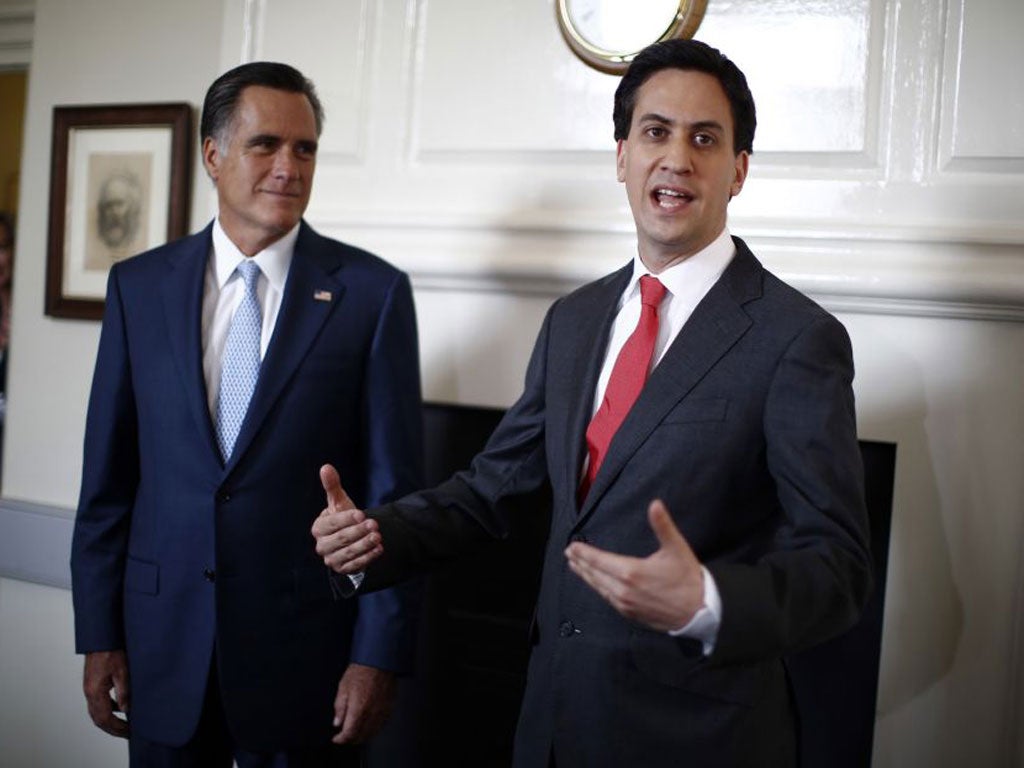Rivals are united in their fear of President Romney
View From Westminster

Your support helps us to tell the story
From reproductive rights to climate change to Big Tech, The Independent is on the ground when the story is developing. Whether it's investigating the financials of Elon Musk's pro-Trump PAC or producing our latest documentary, 'The A Word', which shines a light on the American women fighting for reproductive rights, we know how important it is to parse out the facts from the messaging.
At such a critical moment in US history, we need reporters on the ground. Your donation allows us to keep sending journalists to speak to both sides of the story.
The Independent is trusted by Americans across the entire political spectrum. And unlike many other quality news outlets, we choose not to lock Americans out of our reporting and analysis with paywalls. We believe quality journalism should be available to everyone, paid for by those who can afford it.
Your support makes all the difference.The so-called "special relationship" is still deep enough for the US presidential elections to command the fascinated and to some extent self-interested attention of UK leaders. For the second successive election, those at the top of the three main parties almost certainly want the same candidate to win.
The qualification is important. No one can be wholly certain in the case of a Prime Minister. It is normal procedure for the UK's elected leader to give no overt indication as to whom he supports.
Publicly David Cameron has not uttered a word in relation to the battle between President Obama and Mitt Romney. But when I asked a close ally of Cameron's who he thought Cameron privately hoped would win he said without a second's hesitation: "Obama".
In a relatively modest way, Cameron has established a good relationship with the President. During an otherwise stormy spring for Cameron, Obama gave him the intoxicating red carpet treatment in Washington. Famously George Osborne went too, a week before his Budget.
Obama paid ceremonial homage partly with his presidential contest in mind, hoping to show Middle America that his moderate centrist approach enabled him to form a rapport with a Conservative Prime Minister.
Cameron, who had his doubts about the war in Iraq, would also probably prefer Obama's cautious expediency in foreign policy, although he found him too indecisively cautious over Libya. Romney's more hawkish posturing is unnerving for a British leader after the war in Iraq.
In terms of the minor domestic consequences, as Cameron looks towards his own appointment with the British electorate, he probably benefits more from being seen to work well with Obama in his second term rather than with Romney, a multi-millionaire who began his campaign as a right-wing radical.
There is no electoral advantage either for Cameron to be associated with a Republican Party that struggles to find a coherent voice. "Most of those around Cameron are Democrats," claims one friend of the Prime Minister's.
More widely, Cameron would be able to take a little comfort if the incumbent were to win in the midst of economic gloom. After all, he will be trying to do the same in the UK.
For Ed Miliband and Nick Clegg, the choice is straightforward. Although they have no time for each other, the pair are united in their support for Obama. The President's politics are much closer to both of theirs. Neither Miliband nor Clegg have any links or common ground with Romney.
But it is easy to overstate the degree to which any of the three leaders will view the outcome with their own political fortunes in minds. They watch as individuals with their fingers crossed.
Politically the outcome is unlikely to have much direct impact on British politics. There was feverish speculation about whom Tony Blair wanted to win in 2004: his war ally President Bush or John Kerry. In truth he was genuinely indifferent.
Perhaps the last British Prime Minister to feel a neurotic need to show he could work closely with any US President, Blair had resolved to be the most unswerving ally of whoever won. To a more restrained extent, the same applies to Cameron and would have to apply to Miliband if he were Prime Minister.
Indirectly the impact on UK politics will be greater. Which one has the most effective policies to generate growth? Which one can be relied upon to make the right calls at moments of international crisis? It is in future policy calls that the winner will make his mark in the UK, where the political contest at the next election is likely to be as closely fought as it has been in the US.
Join our commenting forum
Join thought-provoking conversations, follow other Independent readers and see their replies
Comments